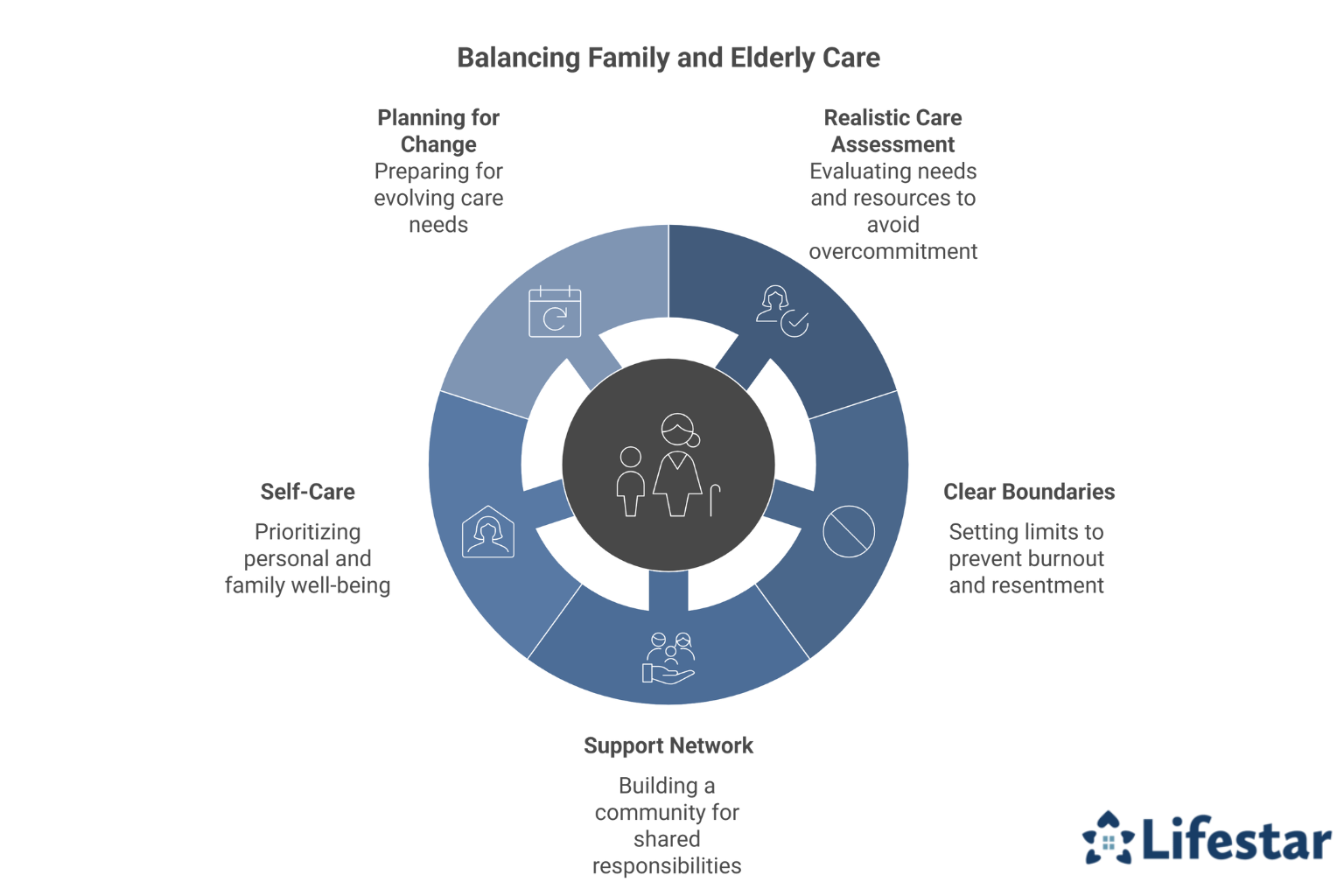
Table of Content
Caring for aging parents while managing your own family’s needs creates complex emotional and logistical challenges. Finding the right balance requires strategic planning, clear communication, and realistic expectations about what you can accomplish alone.
Create a Realistic Care Assessment
Before developing any caregiving plan, conduct an honest evaluation of your parent’s actual needs versus your family’s capacity to meet them. Many adult children overestimate their ability to provide comprehensive care while underestimating the time and energy required.
Start by documenting your parent’s current abilities and limitations:
- Daily living activities he or she can perform independently
- Medical appointments and medication organization needs
- Safety concerns within the home environment
- Social and emotional support requirements
Next, assess your own family’s resources and constraints:
- Work schedules and career obligations
- Children’s activities and school commitments
- Financial capacity for additional caregiving expenses
- Physical and emotional energy levels of all family members
This assessment helps you identify gaps where professional home care services could provide essential support without overwhelming your family’s resources.

Establish Clear Boundaries and Expectations
Successful caregiving requires honest conversations about what each family member can realistically contribute. Avoid making promises during emotional moments you cannot sustain long-term.
Consider these boundary-setting strategies:
- Define specific days and times when you’re available for caregiving tasks.
- Identify emergency situations versus routine requests that can wait.
- Communicate your limitations clearly to prevent resentment and burnout.
- Involve siblings and other relatives in sharing responsibilities.
- Set realistic expectations with your parent about available support.
Remember professional home caregivers can handle many routine tasks, allowing you to focus on providing emotional support and maintaining your relationship with your parent rather than becoming overwhelmed by physical caregiving duties.
Elder care professionals can be a wonderful boon to seniors. Whether they require around-the-clock supervision or just need assistance with exercise and household tasks a few days a week, seniors can enjoy a higher quality of life with the help of trusted in-home caregivers. Families who are focused on balancing family life with elderly care also find that professional support reduces stress while ensuring their loved ones receive consistent attention.
Build a Support Network beyond Family
Relying solely on family members for aging parent care often leads to caregiver burnout and family conflicts. Professional home care services, community resources, and social support networks provide essential assistance that complements family involvement.
Explore these support options:
- Part-time home care for medication reminders and light housekeeping
- Adult day programs that provide social interaction and supervised activities
- Meal delivery services or senior nutrition programs
- Transportation services for medical appointments and errands
- Respite care that gives family caregivers scheduled breaks
Many families discover combining professional services with family support creates better outcomes for everyone involved. Professional caregivers bring specialized training and objectivity that family members may lack.
Prioritize Self-Care and Family Needs
Maintaining your own family’s stability and wellbeing isn’t selfish—it’s essential for sustainable caregiving. Children need consistent attention and support, marriages require nurturing, and careers demand professional focus.
Implement these self-care strategies:
- Schedule regular family activities without caregiving responsibilities.
- Maintain your own medical appointments and health routines.
- Continue pursuing personal interests and social connections.
- Communicate openly with your spouse and children about caregiving stress.
- Seek counseling or support groups when feeling overwhelmed.
The Family Caregiver Alliance reports that family caregivers often experience health problems, job loss, and financial strain. Protecting yourself and your immediate family creates a more stable foundation for supporting your aging parent.
One of the most challenging tasks of helping an elderly relative age in place safely and comfortably is researching agencies that provide home care. Oklahoma City families can turn to Lifestar Home Care for reliable, high-quality in-home care for aging adults. We offer 24-hour care for seniors who require extensive assistance, and we also offer respite care for family caregivers who need a break from their caregiving duties.
Plan for Changing Needs
Aging parent care requirements typically increase over time, making flexibility and advance planning crucial for long-term success. What works today may become inadequate within months as health conditions progress.
Develop contingency plans for various scenarios:
- Increased mobility challenges requiring home modifications or equipment
- Cognitive changes that affect safety and decision-making abilities
- Medical emergencies that demand temporary intensive care
- Financial changes that impact available care options
- Your own family circumstances that affect caregiving availability
Professional home care agencies can often adjust services quickly as needs change, providing continuity that might be difficult for family members to maintain alone. Starting with minimal services and gradually increasing support prevents overwhelming transitions for both you and your parent.
Whether you need respite from your caregiving duties or your aging loved one needs live-in care, Oklahoma City, OK, Lifestar Home Care can meet your family’s care needs. Our dedicated caregivers are available around the clock to provide transportation to doctor’s appointments, ensure seniors take their prescribed medications, and help with a variety of tasks in and outside the home. For reliable in-home care services, contact us today.